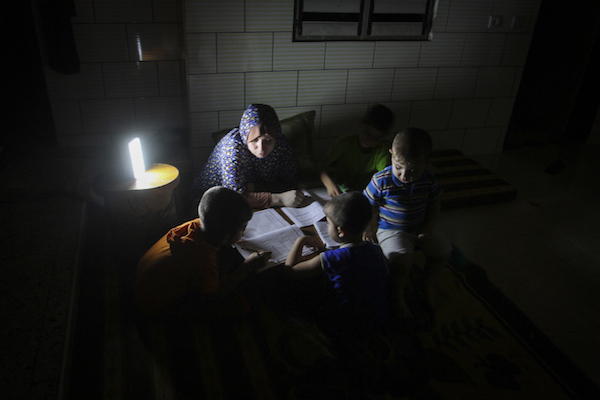The Paris Peace Conference will focus on Israeli settlements in the West Bank. That is because with greater and greater restrictions on movement, and by unraveling the ties that bind Palestinian society, Israel has effectively removed Gaza from the conversation. That is a terrible mistake.
By Tania Hary

This Sunday, senior diplomats and foreign ministers from 70 countries are expected to convene in Paris along with Palestinian officials to talk peace. According to reports, they’re expected to call on the parties to refrain from taking “unilateral steps that prejudge the outcome of final-status negotiations,” code for Israel to please refrain from building more settlements.
There aren’t any Israeli settlements left in Gaza, but for upwards of ten years now Israel has been taking one major unilateral step that pushes a sustainable solution to the conflict further and further away: the Strip’s painful isolation from the West Bank, and the world.
Ties connecting Palestinian society — academia, families, cultural institutions, civil society organizations, businesses and markets — are largely influenced by Israel’s policy on movement between Gaza and the West Bank. At least since the year 2000, and even more stringently since 2007, travel between the two areas of the Palestinian territory has ground to a minimum, a “humanitarian minimum” as Israel calls it. Humanitarian is nice, but it’s not the stuff of state-building.
Gaza’s isolation from the rest of the world, and particularly the West Bank, has resulted in dramatic increases in unemployment, poverty, dependence on aid, and of course instability.
What’s striking is that it has gone mostly unnoticed and is rarely discussed other than in the short periods during and immediately after each of the three major military operations that have occurred there in the past eight years. Even more noteworthy is that senior Israeli security officials often cite the situation in Gaza as running counter to Israel’s security interests.
But while most of the world, and those that will gather in Paris surely, continue focusing on the most glaring and physical incarnation of occupation — the settlements in the West Bank — the fragmentation of the Palestinian territory can’t be ignored. Neither too should the presence of Hamas nor of any action taken by any party to deliberately harm civilians. But the seemingly invisible and indiscernible reality of two million Palestinians being left outside of the discussion, and thus left behind, is both an abomination of morality and a tinder box.
Just this week, protests in Gaza were raging in response to even longer than usual power cuts. The Gaza Strip suffers a constant deficit of electricity supply: supply from all sources — power sold from Israel and Egypt and that produced at Gaza’s sole power plant — simply falls far short of demand. While the population of Gaza, and its electricity demand, has grown steadily for years, the supply has stayed the same.
What some people may not appreciate about Gaza is that demand is high because it’s a modern society. When the power blinks back on, young people rush to charge cell phones and laptops, families run laundry machines, factories run production lines, schools, universities and businesses are lit. Hospitals, which of course must ensure a steady supply of electricity to regular and neonatal intensive care units, purchase diesel in large quantities, from Israel, in order to run industrial generators that help them cope with the cuts.
The anger over the long power cuts that peaked this week is the anger of being forgotten, of being left behind, of knowing you have the potential to be a fully functioning society but watching helplessly while the rest of the world passes you by. It’s palpable at all times when one speaks to people from Gaza — the constant, grating buzz of generators, the frustration of disruptions to one’s work and daily life — but this week, society has experienced a collective snap and is taking to the streets. This time, the violence is raging inside, but for how long?
There are those in Israeli society who see it differently. Just recently, Israeli Education Minister Naftali Bennett told CNN that there already is a Palestinian state, it’s called Gaza. According to Bennett and others who subscribe to the vision of annexing the West Bank or large portions of it, things in Gaza are going swimmingly, exactly according to plan.
In 2004, when then-Prime Minister Ariel Sharon’s aide famously said that the disengagement from Gaza was formaldehyde for the peace process, or in other words, that isolating Gaza from the West Bank would kill any chance for peace, people didn’t really know what to do with it. Quietly, on the ground, by enforcing greater and greater movement restrictions and unraveling the ties that bind Palestinian society, that’s exactly what has happened: a slowly administered, lethal injection to the hope of a peaceful resolution to the conflict. Hamas and its rockets surely don’t help, but there are literally millions of civilians in Gaza Bennett and others hope you’ll continue to leave out of the equation.
Paris is a long way from Gaza but those participating in the peace conference there on Sunday should keep it in their minds instead of only focusing on what they can see with their eyes. Anything short of that isn’t worth the trip, even to that beautiful city of light.
Tania Hary is the executive director of Gisha – Legal Center for Freedom of Movement.
